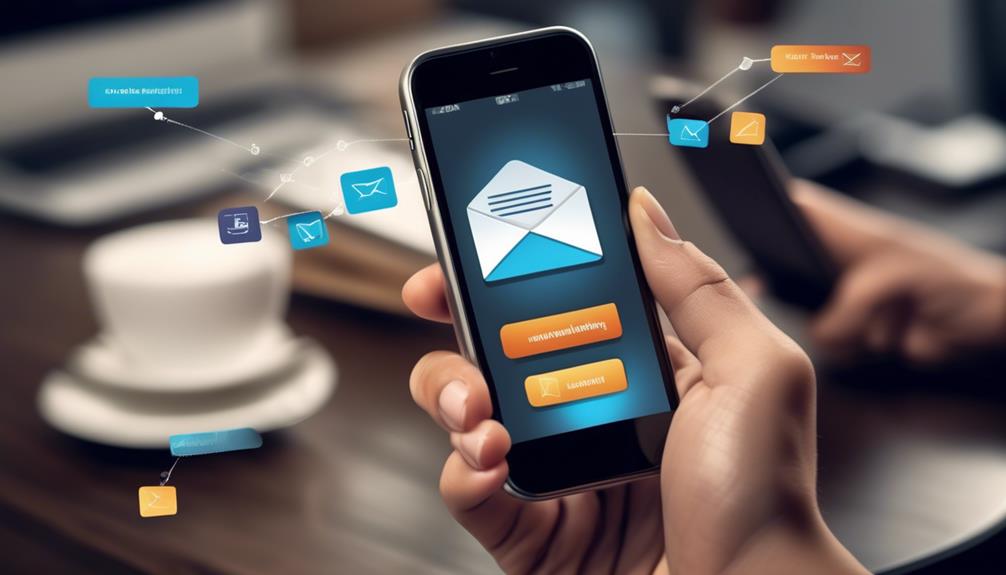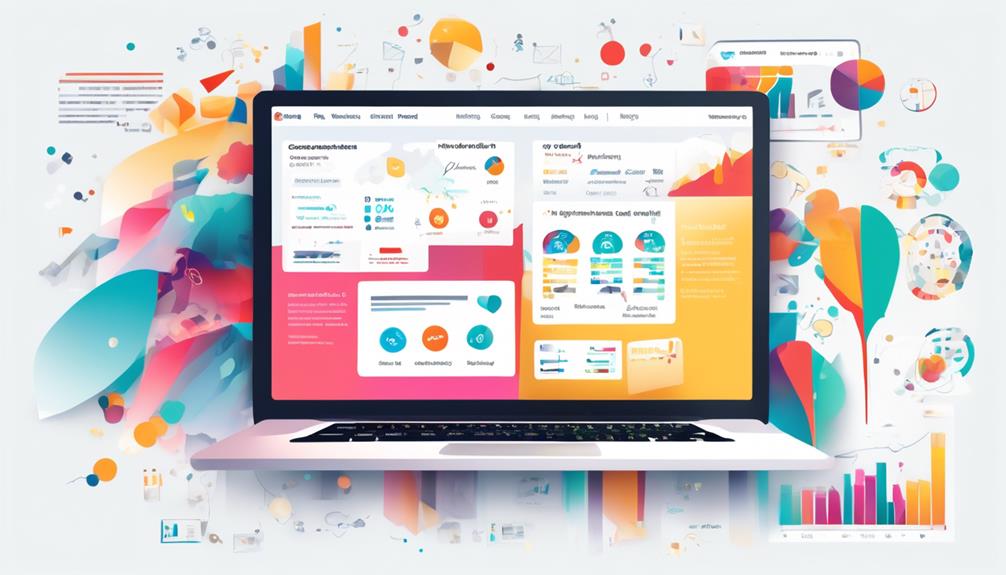Will email marketing continue to be effective in 2024?
With the ever-evolving landscape of digital marketing, it’s natural to wonder if email still holds its ground.
As businesses navigate the complexities of reaching their audience in a crowded online space, the effectiveness of email marketing becomes a focal point of discussion.
While some may question its relevance in the age of social media and instant messaging, there are compelling reasons to consider its continued impact.
Key Takeaways
- Email marketing continues to demonstrate high effectiveness with high open and click-through rates.
- It offers a high return on investment (ROI) with an average ROI of $42 for every $1 spent.
- Email marketing can be adapted to align with digital trends, such as personalization, automation, and integration with other digital channels.
- Understanding and adapting to changing consumer behavior is crucial for maintaining the effectiveness of email marketing campaigns.
Current State of Email Marketing
Email marketing continues to demonstrate its effectiveness as a powerful digital marketing channel in 2024, with high open and click-through rates and the ability to provide targeted reach through segmentation. In fact, statistics reveal that email marketing boasts an average open rate of 20.81% and a click-through rate of 2.43%, outperforming other digital marketing channels. This level of engagement underscores the importance of integrating email marketing into an overall digital marketing strategy.
By leveraging segmentation, businesses can tailor their content to specific audience segments based on demographics, behavior, and interests, resulting in more personalized and relevant communication.
Furthermore, email marketing is a cost-effective strategy with a high return on investment. The average ROI for email marketing is $42 for every $1 spent, making it a compelling choice for businesses aiming to maximize their marketing budget. Additionally, the measurable results obtained from email campaigns provide valuable insights into subscriber behavior and preferences, enabling businesses to refine their email marketing strategy for continued success.
These statistics solidify email marketing’s position as a highly effective and influential tool in the digital marketing landscape.
Impact of Digital Trends

As digital advertising trends continue to evolve, it’s vital to consider their impact on email marketing effectiveness. Changing consumer behaviors and preferences directly influence the success of email campaigns, and understanding these shifts is crucial for maintaining relevance.
Digital Advertising Shift
In today’s rapidly evolving digital landscape, the impact of shifting digital trends on advertising strategies is undeniable. As we navigate these changes, it’s crucial to understand how digital advertising is shifting in 2024 and its implications for email marketing.
Here’s what we need to consider:
- Personalization and Automation: Leveraging advanced technologies to personalize email campaigns and automate customer journeys is becoming increasingly vital in engaging your audience.
- Cross-Channel Integration: Integrating email marketing with other digital channels such as social media and content marketing is essential to align with current marketing trends and maximize reach.
- Data Privacy and Compliance: With evolving data privacy regulations, ensuring compliance and building trust through transparent data practices are paramount in email marketing strategies.
As digital advertising continues to evolve, adapting email marketing strategies to align with these trends is essential for maintaining effectiveness and relevance.
Changing Consumer Behavior
Changing consumer behaviors in response to digital trends have significantly influenced the effectiveness of marketing strategies. With consumers using multiple devices and platforms, their attention is fragmented, making it challenging to reach your customers through traditional means.
However, email marketing remains a powerful tool for engaging consumers. In fact, 99% of consumers check their email every day, providing a prime opportunity to connect with them. By adapting to changing consumer behavior, such as the increasing reliance on mobile devices and the preference for personalized content, email marketing can continue to effectively reach and engage audiences.
Understanding these shifts in consumer behavior allows marketers to tailor their email strategies to meet the evolving needs and preferences of their target audience, ensuring continued effectiveness in 2024.
Cost-Effectiveness and ROI
When it comes to email marketing, the cost versus benefit analysis is compelling.
The high return on investment (ROI) and affordability of email marketing make it a smart choice for businesses of all sizes.
With measurable results and targeted reach capabilities, the data-driven nature of email marketing further enhances its cost-effectiveness and potential for strong ROI.
Cost Vs. Benefit
For businesses seeking a cost-effective marketing channel with a high return on investment, email marketing offers measurable results and targeted reach at a low cost per email. When considering the cost vs. benefit of email marketing, it’s essential to understand its effectiveness in driving engagement and conversions.
Here are the key points to consider:
- Measurable Results:
Email marketing allows for easy tracking and measurement of open rates, click-through rates, and conversions, enabling data-driven decision-making for strategies.
- Targeted Reach:
Through segmentation, email marketing enables highly targeted campaigns, increasing the chances of engagement and conversions by delivering relevant content to specific audience segments.
- High ROI:
With average open rates of around 20% and click-through rates of around 3%, email marketing proves to be a cost-effective way to reach the target audience and drive engagement and conversions.
Return on Investment
Email marketing’s exceptional return on investment (ROI) and cost-effectiveness make it a compelling strategy for businesses seeking measurable results and targeted reach.
With email marketing, businesses can engage their audience at a low cost per email, making it a highly cost-effective approach. The ability to measure results, such as open rates, click-through rates, and conversions, provides clear insights into the ROI of email marketing campaigns.
Additionally, the capability to segment email lists allows for targeted reach, enhancing the cost-effectiveness of reaching the right audience with relevant content. The data-driven nature of email marketing enables businesses to make informed decisions and optimize their strategies for maximum ROI.
Affordability and Results
With its proven cost-effectiveness and strong return on investment, email marketing emerges as a powerful tool for businesses seeking measurable results and targeted reach. The affordability and results achieved make email marketing suitable for businesses of all sizes, contributing to its continued effectiveness.
Here are the key reasons why email marketing is cost-effective and delivers strong results:
- Cost-Effectiveness: Email marketing offers a large reach at a low cost per email, resulting in a high return on investment (ROI).
- Measurable Results: It provides measurable results through easy tracking and measurement of metrics such as open rates, click-through rates, and conversions, enabling data-driven decision-making for strategies.
- Targeted Reach and Personalization: Email marketing’s high open and click-through rates, along with targeted reach and personalized content, make it a cost-effective and results-driven channel for engaging with the audience.
The ability to achieve a high ROI and affordable costs per email highlights the cost-effectiveness and strong results that email marketing continues to deliver in 2024.
Targeted Reach and Personalization

By leveraging targeted reach and personalization in email marketing, tailored messages can be delivered to specific demographics, behaviors, and interests, ultimately increasing engagement and conversions. Personalization allows for the delivery of relevant content to the right audience at the right time, leading to improved open rates, click-through rates, and overall campaign effectiveness. Segmentation enables highly targeted campaigns, improving the chances of audience engagement and conversion. Additionally, personalized emails create a sense of connection and build relationships with subscribers, enhancing brand loyalty.
| Benefits of Targeted Reach and Personalization in Email Marketing |
|---|
| Increased engagement and conversions |
| Highly targeted campaigns for improved audience engagement |
| Enhanced brand loyalty through personalized communication |
Measurable Results and Analytics

Leveraging measurable results and analytics is crucial in email marketing for tracking and analyzing the effectiveness of tailored messages, allowing for data-driven decision-making and continuous improvement.
Email marketing analytics provide valuable insights into subscriber behavior and preferences, enabling marketers to optimize campaigns and improve performance over time.
Measuring open rates, click-through rates, and conversions helps understand the effectiveness of email marketing strategies, leading to informed decisions for future campaigns. It also allows for continuous improvement and the ability to adapt strategies based on real-time data.
By utilizing measurable results and analytics, marketers can gain a comprehensive understanding of how their audience engages with their content, leading to more targeted and effective email campaigns.
This data-driven approach not only enhances the overall impact of email marketing efforts but also ensures that strategies are continuously refined based on measurable results and analytics.
Mobile Optimization and Accessibility

Mobile optimization and accessibility are crucial aspects of email marketing. They ensure that messages are easily readable and engaging across a variety of devices and for diverse audiences.
With the majority of email users accessing their emails through mobile devices on a daily basis, optimizing your campaigns for mobile is essential. Mobile-friendly emails not only improve user experience but also significantly impact engagement levels. By ensuring that emails are easily navigable and visually appealing on mobile devices, marketers can capture and retain the attention of their audience.
Moreover, accessibility in email design is equally important. Creating content that’s accessible to individuals with disabilities, such as incorporating descriptive alt text for images, ensures that all recipients can access and understand the content of the emails.
This inclusive approach not only aligns with ethical considerations but also expands the reach of email marketing campaigns to a wider audience.
Privacy Laws and Customer Trust

Compliance with privacy laws, such as GDPR and CCPA, is crucial for earning and maintaining customer trust.
In the realm of email marketing, maintaining a transparent and relevant Privacy Policy is essential for demonstrating a commitment to protecting customer data and privacy.
To foster customer trust, it’s imperative to obtain explicit consent before adding customers to email lists.
Additionally, respecting customer preferences and providing easy opt-out mechanisms from email communications not only complies with privacy laws but also fosters trust and goodwill.
Adhering to privacy best practices, such as ensuring the confidentiality and integrity of customer data, is paramount for strengthening trust and loyalty.
Role of Automation and AI

Implementing automation and AI in email marketing significantly enhances the efficiency and effectiveness of campaigns. Automation allows for the timely delivery of targeted messages, leading to improved customer engagement and satisfaction. Additionally, AI plays a pivotal role in analyzing customer data to create personalized and relevant email content, ultimately increasing conversions. The use of AI tools, such as GPT-3, further supports in crafting compelling and tailored email campaigns that resonate with the audience. As businesses continue to adapt to the evolving landscape of email marketing, the integration of automation and AI is poised to revolutionize the way companies communicate with their customers.
| Enhanced Efficiency | Personalized Content | Improved Engagement |
|---|---|---|
| Timely delivery of targeted messages | AI analyzes customer data | Increased customer satisfaction |
| Streamlines marketing processes | Creates personalized and relevant content | Higher engagement and conversions |
| Optimizes customer communication | Utilizes AI tools like GPT-3 | Tailored email campaigns resonate with the audience |
Future of Email Marketing

As we look ahead to the future of email marketing, the integration of automation and AI is set to continue revolutionizing the way companies communicate with their customers, paving the way for even more personalized and engaging campaigns.
The future of email marketing holds great promise, with several key trends shaping its evolution:
- Advanced Personalization: Email marketing will increasingly leverage AI to deliver hyper-personalized content, tailored to individual preferences and behaviors, thereby enhancing customer experience and engagement.
- Integration with Other Channels: There will be a growing trend towards integrating email marketing with other digital channels such as social media, creating cohesive omnichannel experiences for customers and boosting brand visibility.
- Interactive and Dynamic Content: Email content will become more interactive and dynamic, using technologies like AMP to deliver engaging experiences within the email itself, thereby increasing user interaction and driving higher conversion rates.
What Are the Current Trends and Strategies for Successful Email Marketing in 2024?
In 2024, email marketing effectiveness 2024 will be centered around personalized content, interactive emails, and automation. Marketers will focus on creating highly targeted and relevant messages that resonate with their audience. Strategies will also include optimizing for mobile devices, leveraging AI for segmentation, and implementing advanced analytics to track performance.
Frequently Asked Questions
Is Email Marketing Worth It in 2024?
Absolutely, email marketing is worth it in 2024. It continues to deliver high open and click-through rates, reaching target audiences effectively.
Through demographic and behavioral segmentation, we can precisely target our messages.
It’s cost-effective, with a strong return on investment.
Plus, the measurable results and analytics provide insights to optimize campaigns.
Is There a Future for Email Marketing?
Absolutely, there’s a bright future for email marketing. It continues to deliver high open and click-through rates, enabling targeted reach and cost-effectiveness.
With detailed segmentation and measurable results, it empowers data-driven decision-making. The potential for personalization and automation further solidifies its effectiveness.
As proven by its track record, email marketing remains a powerhouse in reaching and engaging audiences, making it an indispensable tool for future marketing strategies.
Is Digital Marketing Still Relevant in 2024?
Digital marketing is incredibly relevant in 2024. It allows us to reach a wide audience, with high open and click-through rates. We can target specific groups based on demographics and behavior.
Email marketing, in particular, remains effective, offering cost-effective outreach and measurable results. It’s crucial for businesses to utilize digital marketing strategies in order to stay competitive and reach their target audience effectively.
What Is the Email Trend in 2024?
In 2024, email marketing trends include:
- Personalization
- Hyper-segmentation
- The rise of interactive and dynamic content
Artificial intelligence is increasingly integrated for automation. There’s a push for tighter integration with other marketing channels.
These trends highlight email marketing’s relevance and projected strong presence for the next 10 years. These advancements make email marketing an effective and crucial tool for engaging and retaining customers in the digital era.
Is Email Personalization Essential for the Effectiveness of Email Marketing in 2024?
In 2024, the importance of email personalization for email marketing effectiveness cannot be overstated. Implementing tips for personalized emails can significantly improve open and click-through rates. By tailoring content to the recipient’s interests and behavior, businesses can build stronger connections and drive better results from their email campaigns.
Is Email Marketing Still a Viable Strategy for Business Growth in 2024?
Yes, email marketing effectiveness today remains a crucial strategy for business growth in 2024. With advanced targeting and personalized content, email continues to deliver high ROI for businesses. As long as brands adapt to evolving consumer behaviors and preferences, email marketing will remain a valuable tool for driving engagement and sales.
Conclusion
In conclusion, email marketing remains a powerful tool for businesses in 2024. It offers targeted reach, cost-effectiveness, and measurable results.
As digital trends continue to evolve, the future of email marketing will be shaped by personalization, automation, and integration with other marketing channels.
With its ability to drive engagement and deliver strong ROI, email marketing continues to be a valuable asset for businesses looking to connect with their audience.









